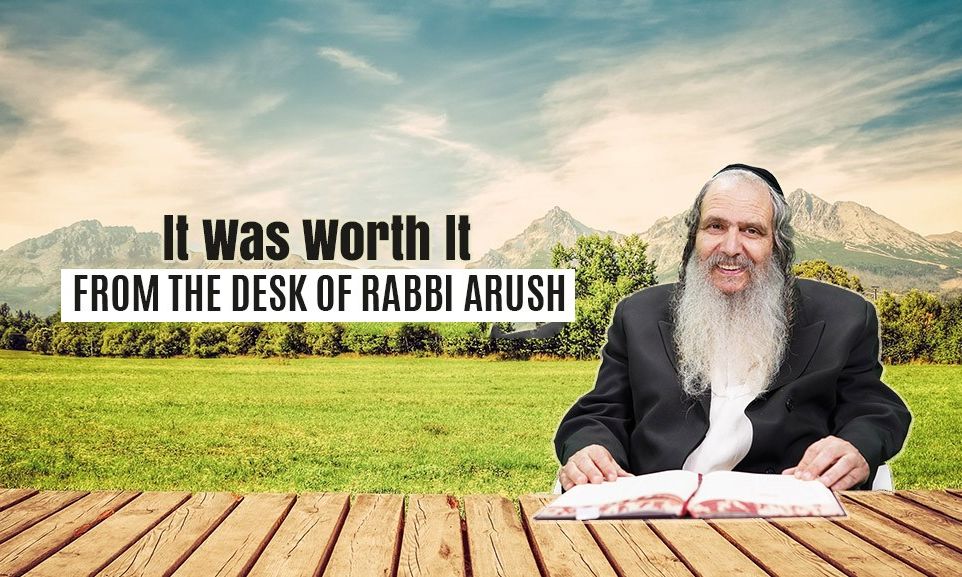
It Was Worth It
When it comes to teshuva, it doesn’t matter what you did, how low you stooped, what you caused with your bad deeds, or what you think of yourself – nothing matters! Hashem can forgive more than a human parent can forgive. What are you waiting for?

Translated from Rabbi Arush’s feature article in the weekly Chut shel Chessed newsletter. The articles focus on his main message: “Loving others as yourself” and emuna.
The Ride That Turned into a Nightmare
He always took a taxi from Williamsburg to Monsey so that he could use the time for a short rest and enjoy a few quiet moments in his tight schedule. He thought that this ride was going to be another routine one, but the moment he settled into his seat, he understood that his hopes had been dashed.
The taxi driver seemed to be overwrought about something and he started a conversation. Our traveler nodded politely and responded here and there, hoping that the conversation would consist of only a few polite sentences and nothing more. But very soon he discovered that a very heavy weight was sitting on the taxi driver’s heart, and he chose to unburden himself on the innocent passenger that he had happened upon.
The traveler understood at the beginning of the conversation that this taxi-driver’s son had cut off contact with his father after a series of conflicts, and after the son had done everything he could to upset his father on a daily basis. Throughout the trip, the driver spelled out in detail the son’s actions; and every time he said something, he experienced the pain anew and became very upset and resentful. He cried and complained endlessly to the passenger, shouting and blaming his son and describing in graphic detail how his life had been ruined time and again with every prank of the son.
The passenger sat quietly, looking forward to the end of this angry monologue, but it turned out to be endless… He finally made peace with his fate and strengthened himself with the faith that apparently Heaven had “arranged” for him a kind of atonement, and yet he still asked himself: “Why do I need to hear all these stories, and what is the Heavenly message in them?”
Only at the end of the ride, when the passenger had already pulled out his wallet to pay for this dubious pleasure and was waiting for the golden opportunity to run for his life from the ongoing nightmare – only then did the driver calm down for a few moments and say to him: “You know what? In spite of all that I’ve told you, in spite of everything he did to me, in spite of all I’ve gone through during all these years, in spite of everything – if he would only come home, if he would only make contact with me, I’d be willing to forgive him for everything!!”
Father is Always Waiting for You
Those last words of the driver made a strong impression on the passenger, and got him thinking, and at the next meeting with one of the tzaddikim he was connected with, he related the story. The rabbi then said to him: “It was worth it to you to hear all those claims and complaints and all the frustration of that driver, just for that sentence! And moreover, because you were exposed to the depth and the extent of that driver’s pain and distress – that increases the power of that sentence and the profound lesson that can be learned from it.”
That tzaddik meant, of course, that one can learn from this story a deep moral about the relationship between every Jew and his Father in Heaven.
It doesn’t matter what you did; it doesn’t matter how much you have pained your Father in Heaven; it doesn’t matter how low you have stooped, it doesn’t matter how many years you have lived a mistake and distanced yourself and exposed yourself to foreign influences; it doesn’t matter what you caused with your bad deeds and how much evil you brought into the world; it doesn’t matter what you think of yourself – nothing matters! You should know and believe, with complete and certain faith, that your Father in Heaven is willing to forgive everything in a moment, because a father is a father, and a father always loves his child, no matter what.
You have no idea what a father’s heart is, not to mention the heart of our Father in Heaven!
Our Father in Heaven tells you exactly that: Just make contact, just show some willingness to come home – and I will forgive you for everything, I will show you all My love; I will give you the opportunity to start afresh!
There is Love – There is no Despair!
The biggest factor that prevents a person from doing teshuva is despair. A person feels that he has burned all his bridges and that there is no chance at all that after everything he has done Hashem will accept his teshuva (repentance). Thinking “I have no chance; I have no hope” – is the biggest mistake!
But what can one do? How can one cope with this awful feeling? Anyone who has hurt a friend well understands the immense difficulty, the embarrassment of having hurt a friend, and that makes asking for forgiveness very difficult. In many cases you know that there is no chance that your friend will forgive you, and therefore you don’t even try. It is natural for a person to make the mistake of feeling the same way when it comes to Hashem.
The only remedy for this feeling is that Hashem is a Father! Hashem is a loving Father! A father always remains a father! A father is always willing to forgive! A father is always waiting for his children!
If you don’t believe that Hashem is a Father – you cannot do teshuva. You cannot believe that you have hope and a chance to start anew, and that is precisely the most dangerous kind of despair. Only when you believe that Hashem is your Father, and a Father always loves, and His love is eternal – only then do you have the emotional strength to start anew: You have hope, you believe that your teshuva will be accepted, and then truly there is no despair in the world at all.
Returning to your Father
Actually, this is spelled out in the midrash on the passuk “And you will return unto Hashem, your G-d” 1:
What is this like? It is like a prince who fell into bad ways. When this prince was still in the palace, the king appointed a governor to be with him all the time. And even after the prince had fallen into bad ways, that governor still maintained his contact with him. So the king sent a message to his son through the governor, saying to him: “Return, my son.”
The son told the governor to tell his father that he was very embarrassed to return and beg forgiveness because of all the distress he had caused his father, the king. He said: “With such a face I will leave my bad ways? I am ashamed to face you.” The king heard the reply and asked the governor to tell his son: “My son, is there a son who is ashamed to return to his father?! And if you come back, aren’t you returning to your father?!”
The midrash explains the idea behind this parable: “In the same vein, the Holy One, Blessed Be He, sends Yirmiyahu to Yisrael when they have sinned, and tells him: ‘Go tell my sons to return’… and Yisrael was saying to Yirmiyahu, ‘With this face we return to the Holy One, Blessed Be He? … As it says, ‘We wallow in our shame; our disgrace envelops us; we sinned against Hashem our G-d’. And the Holy One, blessed Be He, sends a message back to them: ‘My children, if you are returning, aren’t you returning to your Father?!” For it says, “For I was a Father to Yisrael”. You said to Me at Mount Sinai, “And my inner self longed for Him.” So, I too say to you: ‘Is Efraim not a precious son to me, a delightful child?… Therefore, my inner self longs for him, I will show him great compassion, declares Hashem.”
The words of the midrash speak for themselves. But one can see clearly that when it comes to any kind of despair regarding doing teshuva, Hashem has a clear answer: My love for you is eternal and unconditional! You can always return to me, and I will always accept your teshuva!
That is what we read in this week’s haftara. Hashem yitbarach vowed that He will never again bring a deluge upon the world or destroy it, and so too, he vowed to love us forever. In the book of Shoftim (Judges) it says, “I will never break My covenant with you.’ 2 But His vow about His love for us and His endless compassion for us is much stronger than His vow not to destroy the world, as it says, “For these are the waters of Noach to me, and I swore that the waters of Noach would never sweep again over the earth. And so did I swear no more to be furious with you, no more to rebuke you. For mountains may move, hills may crumble away, but My love for you will not be moved, nor My pact of peace crumble. So speaks Hashem, who cares for you.” 3
Editor’s Notes:
1 Devarim (Deuteronomy) 30:2
2 Shoftim (Judges) 2:1
3 Yeshayahu (Isaiah) 54:9-10


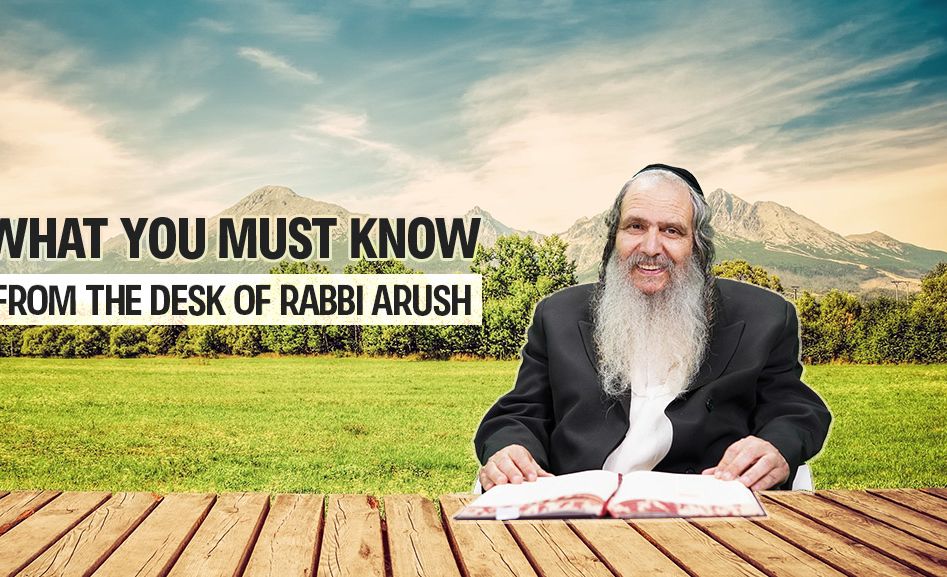
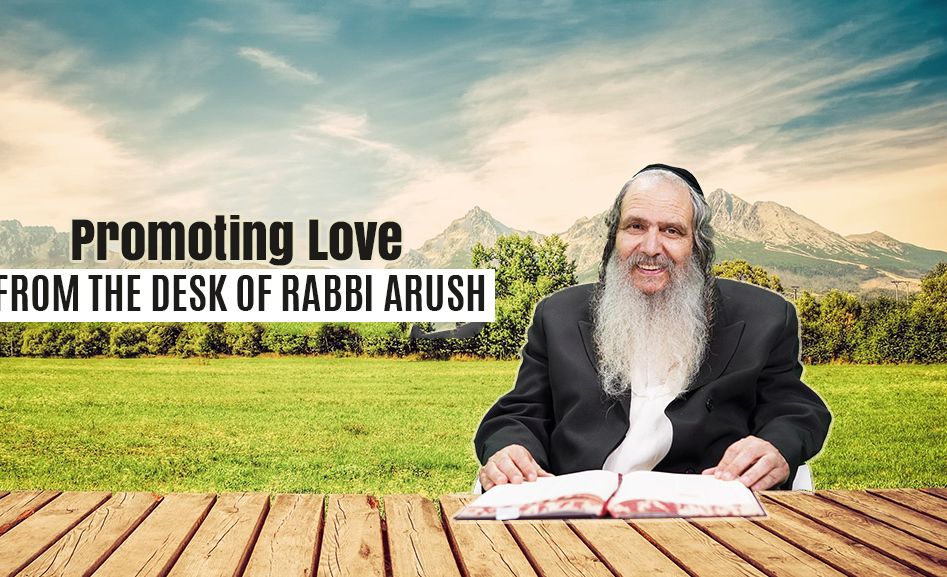
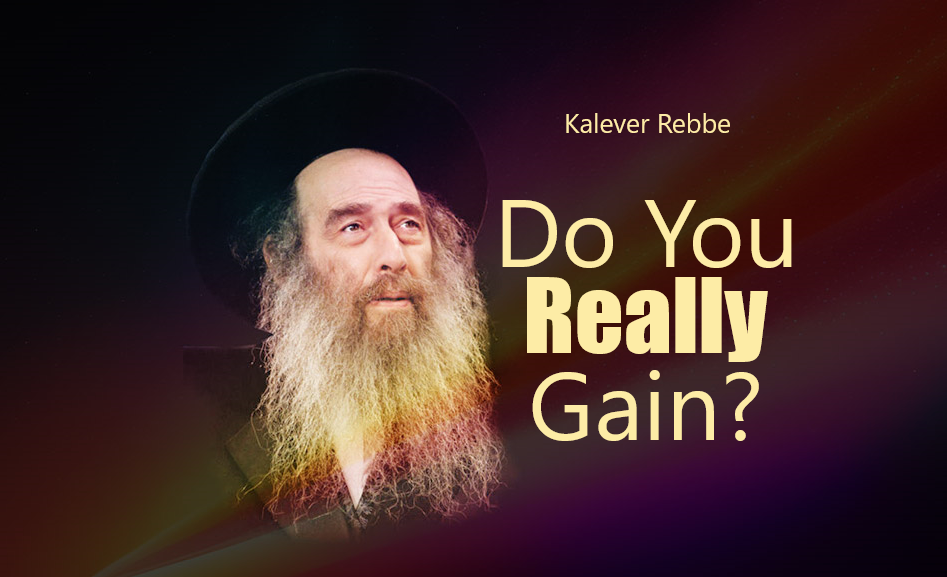
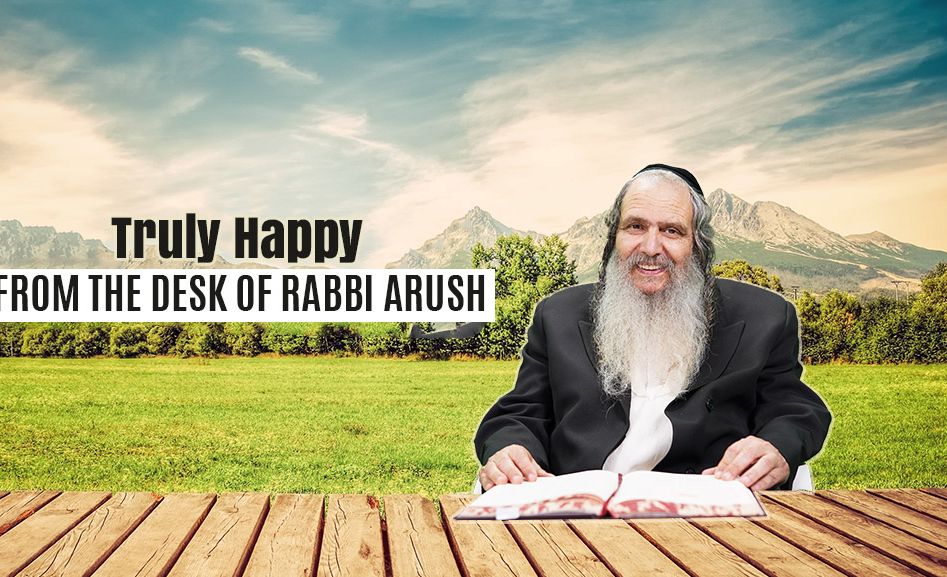





Tell us what you think!
Thank you for your comment!
It will be published after approval by the Editor.